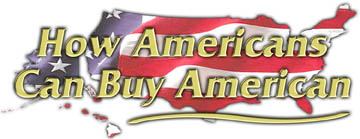 Supporting American-Made Products and Services from American-Owned Companies |
It's very easy to defend protectionism
Our Buy American Mention of the Week! by Roger Simmermaker April 3, 2017 Even free trade and free market advocates believe that protection of U.S. citizens is an important task of government, except when it comes to protecting the American jobs of our citizens, of course. Our country was founded on all kinds of protections for the American people. We rely on and expect national defense, police protection, fire protection, protection from enemies both foreign and domestic, protection from terrorism, frivolous lawsuits, counterfeit products, battery, assault, stalking (restraining orders), lemon laws, etc. We also have the Equal Protection Clause of the 14th Amendment of the U.S. Constitution, which prohibits states from denying any person within its territory the equal protection of our laws. Few would agree that laws should be applied unequally. But when it comes to your job, especially if you are employed in manufacturing, free traders have determined that you deserve no protection. Lose our job due to a badly-negotiated free trade deal? You're on your own. Most free traders don't even think you deserve taxpayer funding to go back to school and learn the necessary skills for a job in the "new economy" (whatever that is), even though we spend $400 million worth of taxpayer funds annually for the sole privilege of putting gainfully employed Americans in unemployment lines. Free trade politicians have decided that American workers who abide by and absorb the cost of American laws and have high living standards (as described in the protections above) deserve absolutely no protection from foreign producers who need not abide by and absorb the cost of American laws. Workers in foreign countries don't pay taxes to America. They don't contribute to Social Security, national defense, Medicare, repairing our crumbling infrastructure, and veteran's benefits, etc. In short, nothing is free and there is no free lunch. Freedom isn't free. Our high national living standards aren't, either. Everything comes with a price, even if that price comes in the form of an occasional higher cost to the consumer in the form of higher prices for American-made goods. President William McKinley was once quoted as saying: The foreign producer has no right or claim to equality with our own. He is not amendable to our laws. There are resting upon him none of the obligations of citizenship. He pays no taxes. He performs no civil duties; he is subject to no demands for military service. He is exempt from state, county, and municipal obligations. He contributes nothing to the support, the progress, and the glory of the nation. Why should he enjoy unrestrained equal privileges and profits in our markets with our producers, our labor, and our taxpayers? Alexander Hamilton, for example, believed in a strong, protectionist U.S. economy where American workers were protected from cheap, foreign competition. Hamilton didn't worry about whether we had the lowest prices in the world. He worried about having enough manufacturing jobs to employ Americans. After all, people who don't have jobs don't necessarily care if the store down the street is having a "buy one - get one free" sale because people without jobs and income can't buy anything. Given a choice, Hamilton believed Americans would choose secure, higher paying jobs even if prices were a little higher over scarce, insecure jobs with lower pay and lower prices. If prices happen to go higher due to higher-cost domestic manufacturing, workers who are secure in their jobs can cut back on spending just like most Americans did during the 2008 economic crisis. Perhaps President Warren Harding (who admittedly wasn't our most-celebrated president) said it best: One who values American prosperity and...American standards of wage[s] and living can have no sympathy with the proposal that easy entry and a flood of imports will cheapen our cost of living. It is more likely to destroy our capacity to buy. Despite his popularity standing among other U.S. presidents, he was absolutely correct on this one. The economy is the only competitive activity that doesn't require that all players must abide by the same rules. In any other game or sport, whether it's chess, golf, baseball, basketball, soccer, etc., all players must play by the same rules. In the game of poker, for example, everyone who sits at the table and wants to share in the pot must ante-up the same amount as everyone else to access the funds in the pot. Not so in the global economy. If you're a foreign producer and you want to share in the pot that is represented by the lucrative U.S. market, you don't need to "ante-up" the same amount to participate. We allow foreign producers to access the U.S. market for a lower cost than U.S. producers. Here is one quick example among several: For every U.S. job that is outsourced, thousands of dollars are lost to the Social Security Fund which increases every U.S. citizen's tax bill. Since both the U.S. worker and his or her employer share paying the 15% contribution to Social Security, an outsourced American job that earns a $40,000 annual salary reduces payments to the fund by $6,000 per year. The employer who now employs workers overseas usually also saves thousands more per year on health care costs. One hundred thousand outsourced jobs, based on just a $40,000 salary per American worker, means the Social Security Trust Fund is losing $600 million a year. And it's safe to say we have outsourced a lot more than just 100,000 of American workers' jobs. There are at least 100,000 Chinese workers making toys for the U.S. market, for example. Free trade is based on consumption. Protectionism is based on production. We cannot consume our way to national prosperity. To prosper, we must produce and protect those American workers who do from predatory foreign competition, of which there is never a shortage. 1939
|
